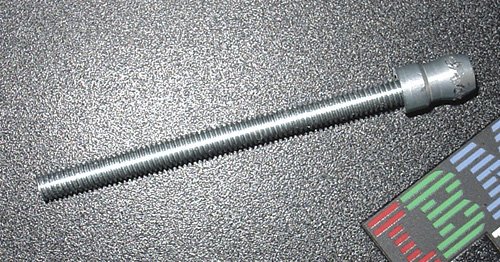This one has me a bit baffled. I had one of my cylinders not firing from time to time for reasons I could only figure had to do with the fact that the wire going to it was cracked and in need of replacement. So I bought a new set of NGK wires and installed them last night figuring that all was well, its not.
The original wires were the the big black type with the metal collar that captures the base of the spark plug. I noticed the original problem would subside if I pulled the plug wire plug off and did not let the metal collar contact the plug base. I could hear the spark jumping from the plug wire plug, then engine would run just fine (I had to ride home this way), but as soon as the metal collar touched the plug it would cut out. Why? I figuered it was due to some internal grounding issue due to the cracked wire.
So the NGK do not have any metal in them other than the element conducting to the plug at the top. This would seem to hae solved the problem, but it didnt. Now, the other side is doing this wierd behavior. The other cylinder was working initially this morening when I started my bike. All sounded good and then it started running on one cylinder. AHHH! Nice day, and now I am late for class. I removed the right wire (original one withour issue) while it was running and there was no change, remove the left and it died. Ok, I plug it all back in, start it up and the problem persists. I pul the right plug again and notice the same behavior I used to get with the old plugs; if I pult the plug wire plug away from the spark plug to where I can hear the spark arching to the plug teh engine jumps to life and runs like it should. WTF? WHY? This makes no sense to me.
How can inducing a bigger arch in the plug cause it to actually fire? The only thing I can think of is that I have the wrong resistance plug wire set, but I bought them from Bob's and they are 5K ohm (which I though was the higher resistance any way).
Help!
The original wires were the the big black type with the metal collar that captures the base of the spark plug. I noticed the original problem would subside if I pulled the plug wire plug off and did not let the metal collar contact the plug base. I could hear the spark jumping from the plug wire plug, then engine would run just fine (I had to ride home this way), but as soon as the metal collar touched the plug it would cut out. Why? I figuered it was due to some internal grounding issue due to the cracked wire.
So the NGK do not have any metal in them other than the element conducting to the plug at the top. This would seem to hae solved the problem, but it didnt. Now, the other side is doing this wierd behavior. The other cylinder was working initially this morening when I started my bike. All sounded good and then it started running on one cylinder. AHHH! Nice day, and now I am late for class. I removed the right wire (original one withour issue) while it was running and there was no change, remove the left and it died. Ok, I plug it all back in, start it up and the problem persists. I pul the right plug again and notice the same behavior I used to get with the old plugs; if I pult the plug wire plug away from the spark plug to where I can hear the spark arching to the plug teh engine jumps to life and runs like it should. WTF? WHY? This makes no sense to me.
How can inducing a bigger arch in the plug cause it to actually fire? The only thing I can think of is that I have the wrong resistance plug wire set, but I bought them from Bob's and they are 5K ohm (which I though was the higher resistance any way).
Help!

 Um pull the plug lay on cylinder, crank with ignition on, see if plug fires. Had the same kind of thing happen 4 years ago, liked to drive me nuts. Would not fire and when I got rough with it ( tried to rev it hard it backfired ) Turned out to be a condenser. Of course that was after checking points, pulling carbs down ( thought it was a diaphram ) and finally just taking a shot in the dark.
Um pull the plug lay on cylinder, crank with ignition on, see if plug fires. Had the same kind of thing happen 4 years ago, liked to drive me nuts. Would not fire and when I got rough with it ( tried to rev it hard it backfired ) Turned out to be a condenser. Of course that was after checking points, pulling carbs down ( thought it was a diaphram ) and finally just taking a shot in the dark.


